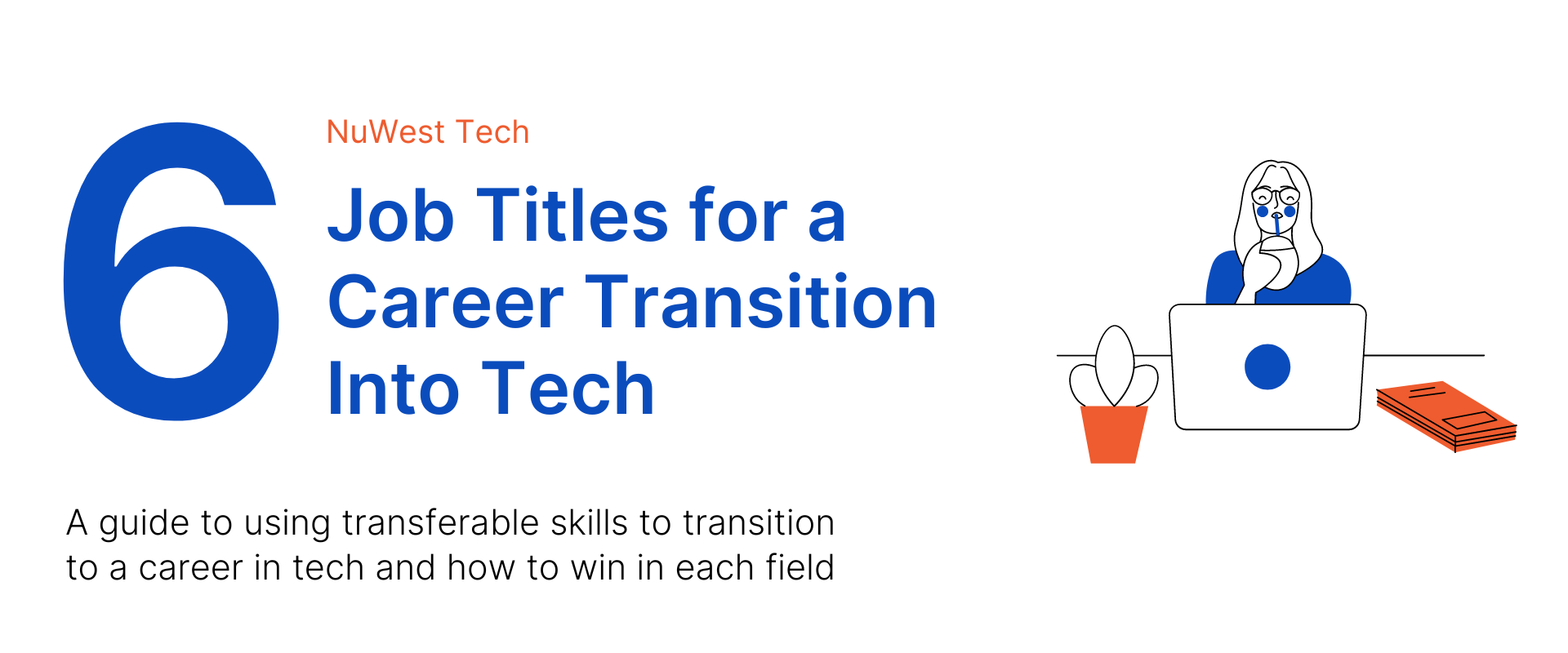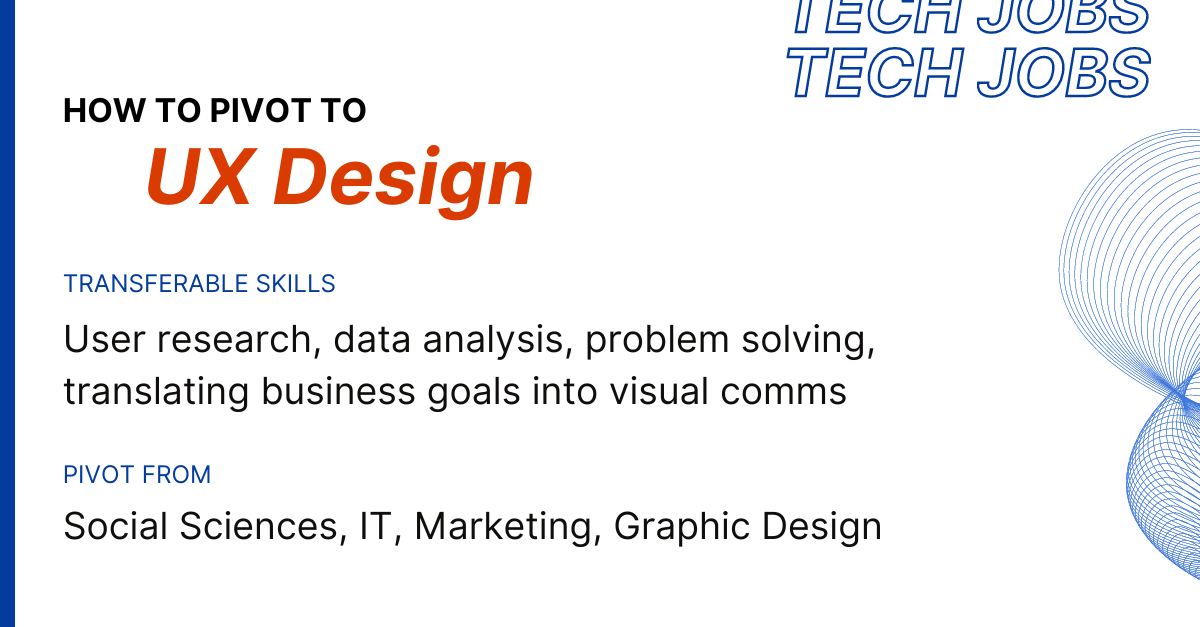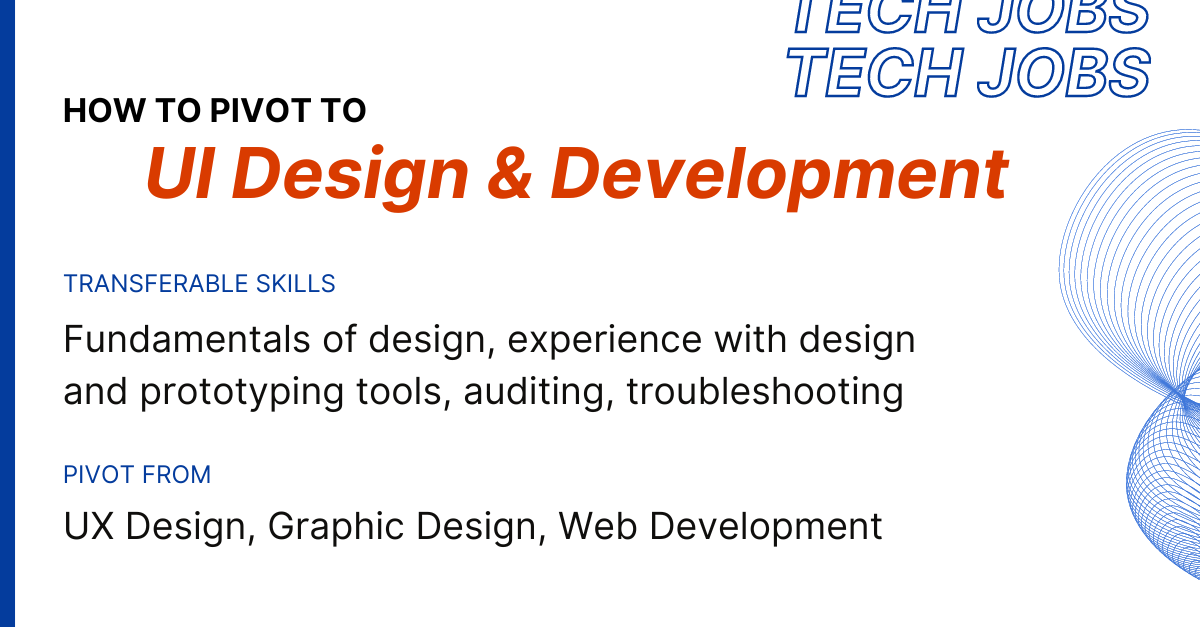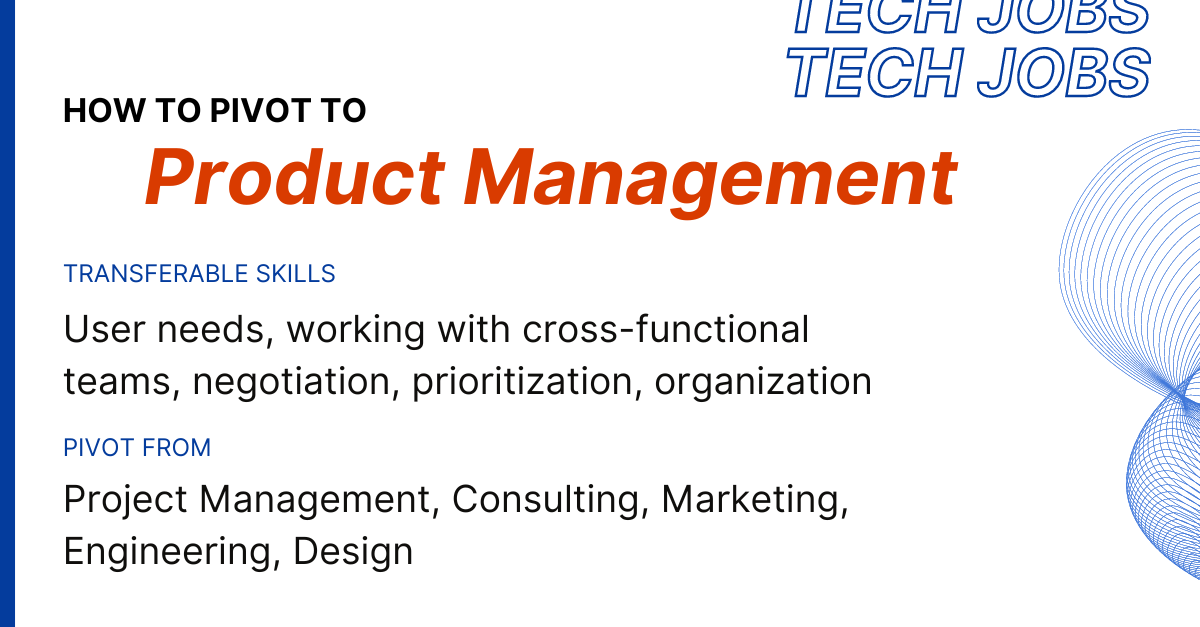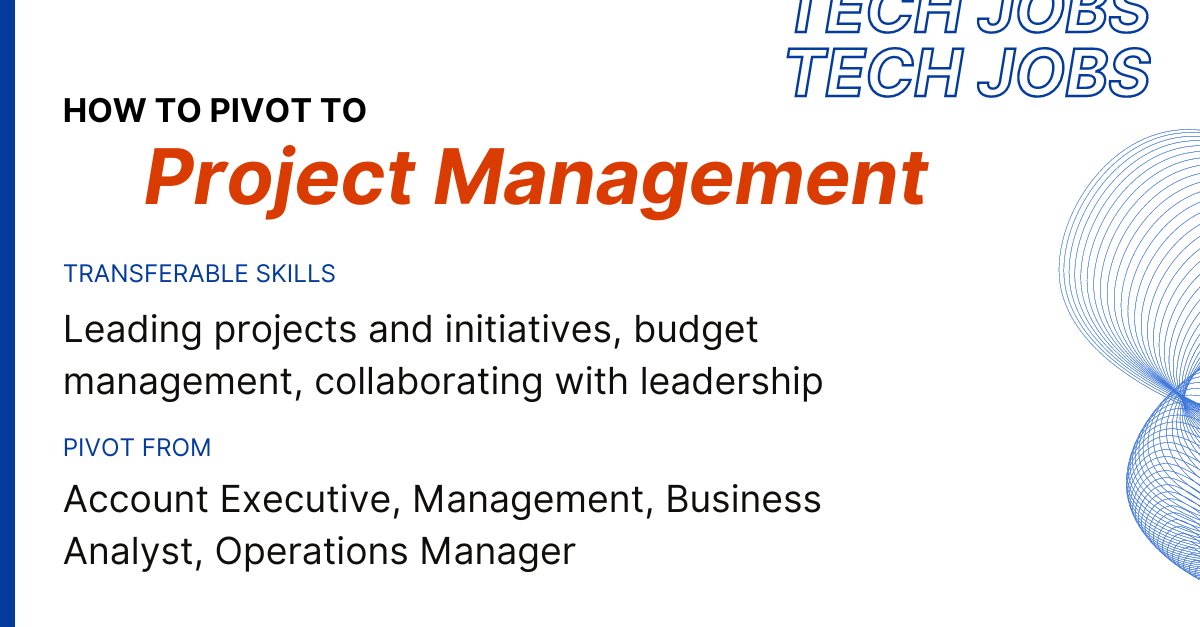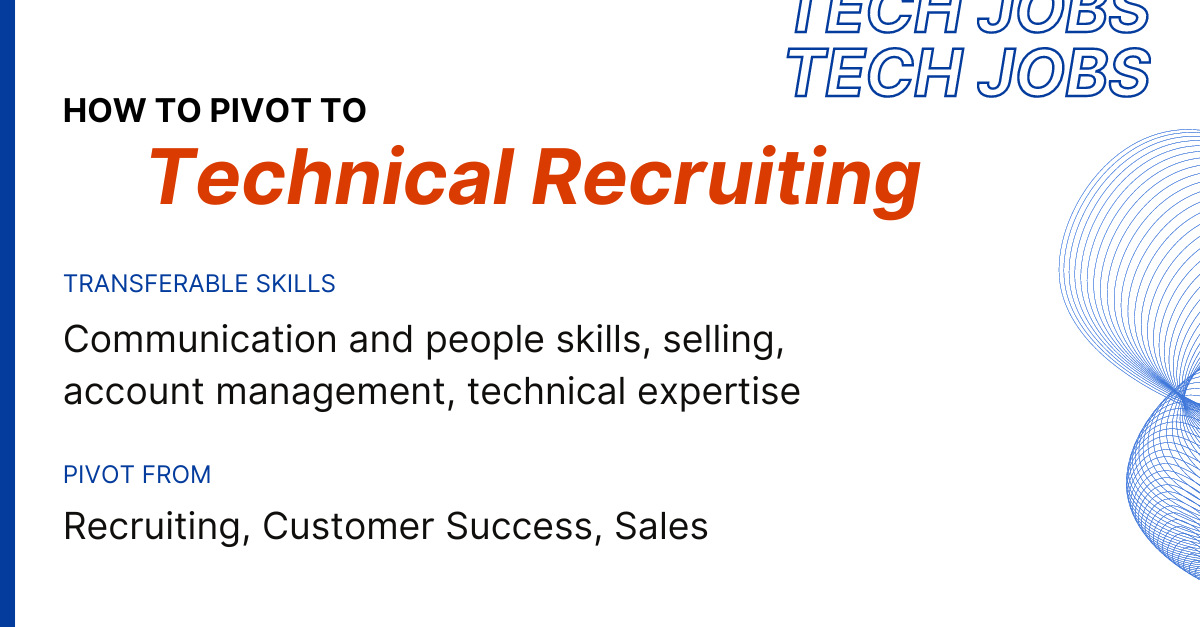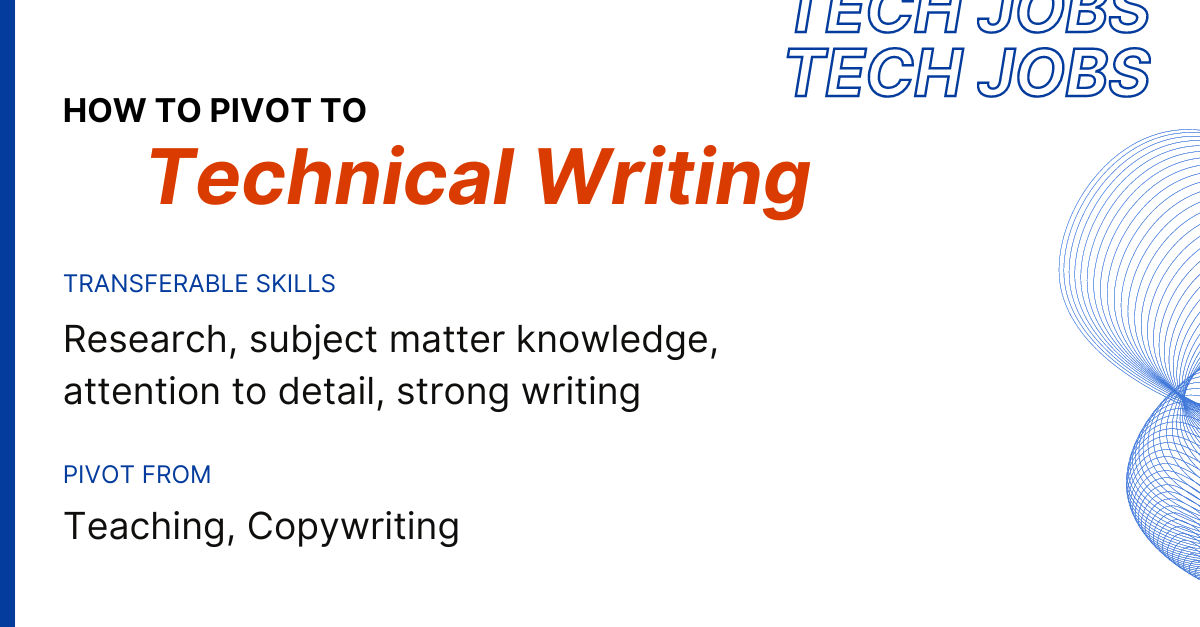The allure of fast growth, big salaries, and a casual work culture has drawn job seekers to the tech industry over any other. If you’re looking to make a move for higher pay, gain new experiences, or get a foot in the door at a cutting-edge company, you need a plan.
Your prior work experience and skills are more relevant thank you think.
Pivoting into a new industry is easier when you know how to frame your experience. Go to your favorite job board and find five job openings you are interested in.
- Break down the role responsibilities and required experience for individual skills, experiences, or knowledge that you already have (if you’re feeling retro, print them out and use a highlighter).
- Write out stories from previous experiences that relate to each of the skills requirements.
- If industry experience that you do not have is required, draw similarities between your desired industry and your current one, then describe how you added value or solved a problem.
We’ve rounded up six of the most in-demand roles and how to use them to launch a career transition into tech–
- UX Design
- UI Design & Development
- Product Management
- Project Manager
- Technical Recruiter
- Technical Writer
UX Design
UX design has blown up in the last five years with the expansion of app usage and increasing digital content consumption.
Transferable skills
- Critical thinking and problem solving
- Listening to and applying feedback
- Translate business goals into visual communication
- User research and human behavior understanding
- Performance data analysis
Transition from
- Social Sciences – a solid understanding of human behavior is one of the hardest things to train in the field of UX. Armed with that, the technical know-how is a Youtube video away.
- IT – Most UX-ers start from a design background and have a heavy lift understanding what is possible within a web interface. Your technical knowledge will give you a leg up to research or design
- Marketing – your current skillset revolves around people and actions you’d like them to take
- Graphic Design – your eye for design will help you craft elements that inspire action
UX Design Median Pay — $84,390
How to win
After an influx of crash courses there are a lot of people with less than 2 years of experience looking for jobs in this field. Most companies consider that a junior level and are seeking more seasoned designers. However, there is plenty of opportunity for upward movement to fill more senior needs if you’re willing to do the work.
Here’s how to win:
- Strong portfolios are a must
- r/Uxdesign does portfolio critiques every week. Look through those for pointers and ask more advanced UX designers to evaluate yours.
- Expedite your experience
- Take contract work at a few companies to gain experience in different teams and industries. (We can help you with that part). You’ll be expected to hold your own, so you do need some experience but think of this strategy as a power up to catalyze progress.
- People skills matter
- Designers and programmers both tend to attract introverts and people who would rather focus and be heads down. Client-facing designers and team leads get paid more and have more opportunities. If you can hone speaking skills and confidence presenting your work, you’ll rise through the ranks faster. We can coach you through interviews and how to present yourself even if that’s not your jam, but we also recommend reaching out to people you know who *are* good at those things.
- Get a mentor
- Not to spin old news, but this is seriously one of the most cited reasons successful people get to where they are. If you don’t know anyone personally, look out for leaders or high performers in the industry on LinkedIn and reach out. Hot tip: don’t simply ask them to be your mentor- ask them for help on a specific thing that they have a strength in, and you need to improve. People are more likely to help if there’s a more focused question they can latch on to.
UI Design & Development
UI design has grown exponentially in recent years as digital platforms have become THE way brands interact with and sell to customers. It is more important than ever for brands to have innovative and interesting interfaces that cater to their user’s needs.
Transferable skills
- Awareness of design elements like textures, color gradients and font styles
- Familiarity with design and prototyping tools
- Attention to detail
- Troubleshooting and auditing
- Effective communication
Transition from
- UX Design – your customer focus and eye for design will make for a smooth transition to development
- Graphic Design – aesthetics and design are half the UI battle; technical knowledge is the other half. You’ll excel with your experience concepting and executing on design using tools and software.
- Web Development – same same, but different. Developing a skillset beyond workflows and design sets you apart and transfers your abilities across various platforms.
UI Design & Development Median Pay — $72,230
Here’s how to win:
- Learn industry standard design tools
- Become familiar with the most used design programs. The design process involves creating mockups and prototypes– having those skills in your toolbox will put you ahead. Learn Photoshop, Figma, Sketch, or Adobe XD. Follow tutorials from experienced designers to help you get started.
- Create a portfolio
- Even if you’ve never worked as a UI designer you can do projects on your own and add those to a portfolio–after all, practice makes perfect. Sites like dailyUI.io provide prompt projects and you can pick up gig work on Fiverr or Upwork to test out your skills once you’re confident.
- Networking (yes, it works!)
- Connecting with others in the field is crucial. You never know what opportunities you can create for yourself. Whether you find a new job or a mentor to learn from, it starts with networking. Join groups on LinkedIn or Facebook and interact with reddit threads like r/UI_design.
- Be familiar with fundamentals of design
- Having an eye for design doesn’t come naturally to all. You’ll want to master the basics of color theory, composition, and font pairings. These are key elements of a visually appealing design.
BONUS: UI designers create designs that developers or engineers will build. Knowing the basics of html, css, or the platform you’re working on will make communicating your design features easier.
- Having an eye for design doesn’t come naturally to all. You’ll want to master the basics of color theory, composition, and font pairings. These are key elements of a visually appealing design.
Product Management
The Product Manager position has been picking up steam in the past decade. Most companies rely on PMs to define success for a product and champion that product through its lifecycle while balancing user and business needs.
Transferable skills
- Understanding of customer needs
- Working cross-functionally with technical and non-technical teams
- Negotiation skills
- Prioritization and organization
Transition from
- Project Management – use your time management, project planning, and leadership skills to make a smooth transition
- Consulting – your familiarity with business and technology is a solid steppingstone to the three pillars of product management
- Marketing – understanding of customer pain points is the foundation of user stories, user journeys, and user research
- Engineering – you’ll excel in roles that demand a higher level of technical expertise
- Design – your background in user experience and wire-framing will help you advocate for and create a product people want to use
Product Manager Median Pay — $82,225
Product Management is still a relatively new position that struggles to be defined. PM responsibilities vary widely across different sized organizations and different industries. These unknowns make it difficult for PMs to segment themselves and define and label strengths and skills.
Here’s how to win:
- Highlight your soft skills
- Product Managers need to be able to communicate effectively across many different teams within an organization. Strong people skills, communication skills, and management skills will help you stand out among other candidates with a similar background.
- Interview prep
- Be ready to talk about a product in all aspects in depth. A favorite tactic in PM interviews is to have the interviewee discuss a product they think is successful and why. From marketing to development to pricing, have your research done and present it like you are the PM of this product. And remember, it’s all about the vision. Have ideas on how to improve the product and share your vision for innovation.
- Double down on management
- As a PM, you will have to juggle prioritization, decision making, and people management. You won’t get far with a poorly managed team. Take time to reflect on your management style and think of ways you’d like to improve. Having a clear vision of how you will approach your new team and strategies on how to gain influence and respect will make the transition into any new team that much easier.
- Utilize your network
- Connect with PMs on LinkedIn or post in threads like r/ProductManagement to gain valuable insights about the field. Resume reviews, interview help, and connections to organizations will be invaluable as you search for a PM role.
Project Manager
Project Managers are responsible for driving an entire project through initiation, planning, execution, control, and completion. PMs are valuable in virtually every industry.
Transferable skills
- Leading initiatives or projects
- Budget management
- Problem solving
- Working with leadership and cross functional teams
- Organization and prioritization
Transition from
- Account Executive – acting as the liaison between your business and customers will make for an easy transition
- Management – your skills managing workloads and resources coupled with your alignment with business goals and leadership will make you a strong candidate
- Business Analyst – your focus on business outcomes and securing buy-in from stakeholders is a fundamental function of project management
- Operations Manager – success creating operational efficiency and optimizing spend will push you ahead of other candidates
Project Manager Median Pay — $76,750
How to win
The success of a project manager depends on the organization, the project manager, and the team itself. If a team is unwilling to cooperate with a project manager or an organization is unwilling to provide the budget, change, or resources needed to meet goals success becomes very difficult to achieve.
Here’s how to win:
- Know the basics
- Be familiar with methodologies like Agile, Waterfall, Scrum, Jira, Gantt, backlogs, breakdowns and estimations, and basic documentation like scopes of work. This will help you adapt to projects you’re assigned to and help you select the best methods for each new project.
- Consider a junior position
- Working under an experienced PM as a junior PM or in an assistant producer role will help you pick up the fundamentals quickly. It will also allow you to apply your PM knowledge in real work scenarios and gain feedback from someone knowledgeable in your industry.
- Get certified
- While certifications are not required, Project Management certifications are highly valued. A certification is valuable early in your career when paired with relevant knowledge and experience in your field. Popular certifications include PMP, PRINCE2, and Scrum certs. It’s worth noting that as you progress in your PM career, certifications become less valuable to recruiters.
- Choose the right organization for you
- It goes without saying that you should choose an industry you are interested or experienced in. Beyond that, the size of the organization heavily affects the role of a project manager within that organization. Roles in smaller orgs with less or a sole project manager can come with more responsibilities and a workload that can be too much to handle for a PM early in their career. Conversely, larger organizations with more support and personnel can provide a healthy environment for a newer PM to explore different methods and techniques while having the support to do so.
Technical Recruiter
So long as technology continues growing and advancing there will be a need for people and if there is a need for people there is a need for a recruiter to attract employees to the organization.
Transferable skills
- Communication and people skills
- Selling and account management
- Competitive spirit
- Technical expertise
Transition from
- Recruiting – you already know the ins and outs of the recruiting process, you’ll just need to flex your technical expertise
- Customer success – client care is a large part of recruitment and you’ve already got this nailed
- Sales – what is recruitment if not selling – selling candidates on the job and clients on the right candidate
Technical Recruiter Median Pay — $63,714
A barrier to tech recruiting can be experience. Some organizations want technical recruiters to have specific job experience in the areas they are recruiting for. This can make it difficult for recruiters to transfer into tech or join at the bottom level. (Don’t worry! This isn’t a requirement for all organizations)
Here’s how to win:
- Stack your LinkedIn Connections
- Many recruiting roles have commission-based compensation which means your earnings will increase with each placement. It’s crucial to build up a network of professionals in your industry and be able to draw upon that network to fill a role.
- Get to know your industry
- Experience is not always a requirement, but it will give you a leg up if you are looking to break into a highly specialized industry. This doesn’t mean you need to be an expert on product design or software development to recruit in tech, but an understanding of tech processes and how hiring works within tech orgs will go a long way.
- Polish your people skills and personality
- A day in the life of a recruiter involves a lot of talking and connecting to many different people. Recruiters are responsible for understanding the needs of the client and job seekers and maintaining positive relationships with each side. Being social, friendly, and approachable will make a recruiter most effective.
- Be prepared to negotiate
- Recruiters must negotiate offer details on behalf of their candidates and pay rates on behalf of their clients. Recruiters also must negotiate contracts and their commission rate. Becoming comfortable with negotiating and brushing up on how to get the best outcomes will make this part of the job easier to adjust to.
Technical Writer
The boom in technological and scientific advancements directly correlates to an ongoing demand for technical writers. Technical writers are needed in every industry from tech to healthcare to pharmaceuticals.
Transferable skills
- Strong writing skills
- Subject matter knowledge
- Research skills
- Attention to detail
Transition from
- Teaching – as an English teacher, you have a passion for writing and the fine details locked down
- Copywriting – dive deeper into a technical subject and apply your refined writing skills
Technical Writer Median Pay — $66,277
How to win
As other fields like journalism slow down, there may be an influx of writers looking for a career change. Technical writing has yet to see an overflow of available talent surpassing open roles, but over saturation could become an issue in the future.
Here’s how to win:
- Create a portfolio
- The main responsibility of a technical writer is to take complex technical information turn it into something the end user can digest–this includes structuring information in a logical way and providing only necessary information. Being able to showcase your though process, organization, and writing will go a long way.
- Lean on other tech writers
- Join groups on Facebook, LinkedIn, or reddit and connect with other technical writers. This can help you stay ahead of in demand skills, learn about current job openings, and get resume critiques from others in the field.
- Study technical writing specifics
- A certification or course in technical writing may not be a necessary investment if you have a strong writing background but brushing up on specifics in the field via YouTube videos or articles can give you a leg up going into interviews. It helps to have an idea of the technical writing process if you come from a different type of writing background like journalism or PR.
- Highlight background knowledge
- Previous knowledge of a specific field usually isn’t a requirement for technical writer roles, but it is a helpful card to play if you have it. For example, if you are looking to break into technical writing within healthcare and have previous experience as an engineer working with medical devices be sure to discuss that experience with your interviewer.
Salaries from salary.com, based on entry level titles in Seattle, WA.
